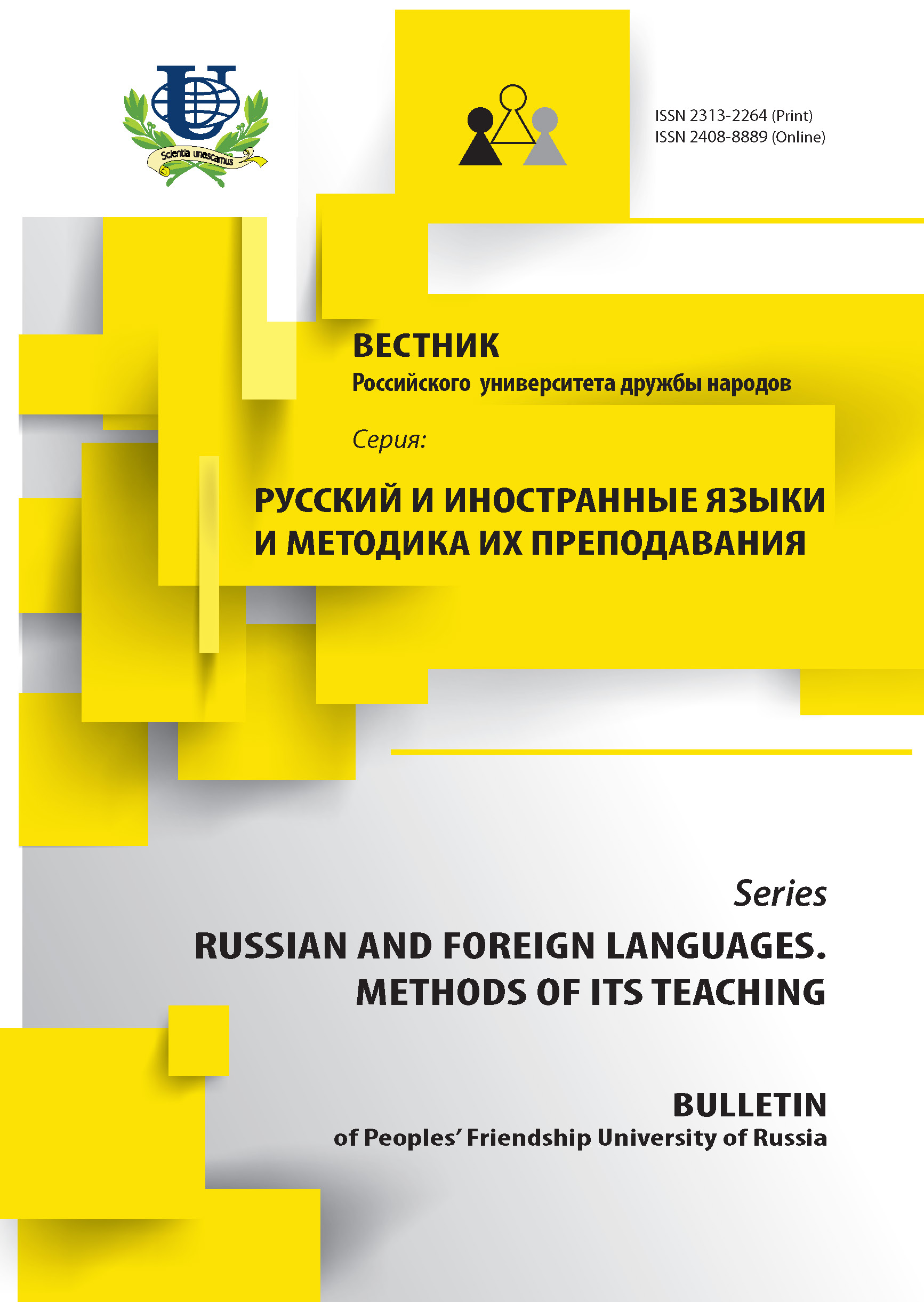No 1 (2011)
- Year: 2011
- Articles: 22
- URL: https://journals.rudn.ru/russian-language-studies/issue/view/629
Articles
 5-13
5-13


Formation of a Russian Speaking Personality in a Foreign Language Society (to the Problem of Specific Textbooks for Foreign Russian Schools)
Abstract
The problem of making up manuals of new generation on the Russian Language and literature is dealt with in the article. These manuals follow basic examples of Russian textbooks taking into account specific character of Russian speaking society in a certain country. The linguistic reality of the country should be conceptually interpreted and systematically presented in these textbooks.
Russian Language Studies. 2011;(1):14-20
 14-20
14-20


 21-28
21-28


theoretical and applied problems of lexical and semantic description of People's nominations in Russian
Abstract
The aim of this study is to present semantic features of linguistic units serving to denote people and forming corresponding lexical and phraseological field in language system. The research determines and describes semantic characteristics of people's nominations in Russian in macro and micro components of their meaning.
Russian Language Studies. 2011;(1):29-39
 29-39
29-39


English and American Borrowings Reflecting Changes in Russian National and Cultural Stereotypes
Abstract
The article studies the problem of enriching Russian lexis with new American English words that is caused by changes in the system of Russian national values. The borrowings are characterised in the aspect of formal and lexical and semantic adaptation in Russian on the material of modern mass media. Special attention is paid to changes in the volume of the notion foreign word and the attitude of language speakers to the above mentioned problem.
Russian Language Studies. 2011;(1):40-44
 40-44
40-44


Teaching Foreign Students-philologists Russian Idioms (on the Example of Phraseological and Semantic Field People's Activity)
Abstract
A high level of phraseological competence cannot be achieved without knowing phraseological units and their proper use in speech. There is no integral system of studying idioms of the semantic field People's activity in the textbooks for foreign pupils. The problem of working out a methodical complex of teaching foreign students Russian idioms is actual nowadays.
Russian Language Studies. 2011;(1):45-51
 45-51
45-51


Verbalization of L.N. Tolstoy's Ideas about School by Syntagmatic Relations of a Keyword
Abstract
The work is devoted to the concept school in L.N. Tolstoy's pedagogical articles. In her research the author refers to the following statement: the information about reality conceptualization processes can be received through analysing syntagmatic relations between words. Lexical compatibility of the concept School in its usual use and in L.N. Tolstoy's texts is analyzed in the article. The results of the interpretation are compared, meanings and senses of concept important for L.N. Tolstoy are revealed.
Russian Language Studies. 2011;(1):52-56
 52-56
52-56


Making up Educational Word-list for Foreign Philologists (on the Example of Theme Fashion. Clothes)
Abstract
The article describes a process of making up an educational word-list for foreign philologists (the 2nd certification level of Russian as a foreign language). This article points out basic principles of an educational word-list. Special attention is paid to the role of the lexis of the thematic group Clothing in the process of teaching Russian. Finally, we present a sample word-list of clothing items.
Russian Language Studies. 2011;(1):57-63
 57-63
57-63


Linguistic and Cultural Commenting of a Russian Fairy-tale with Foreign Philologists
Abstract
The article is devoted to actual problems of teaching a Russian folk text (a fairy - tale) at RFL lessons with foreign philologists. The article deals with theoretical and methodical issues of commenting Russian fairy-tales in education process; we also analyse notions lacuna and linguistic cultureme in linguistic culturology as units with linguistic and cultural meaning and their functions in Russian fairy-tales.
Russian Language Studies. 2011;(1):64-69
 64-69
64-69


 70-73
70-73


Methods of General Lexicographic Description (on the Example of the Word Guest in Russian Language
Abstract
The article deals with the problem of describing lexicographic word meaning as a meaning reflected in the aggregate of explanatory dictionaries. On the example of the word guest in Russian we show that a lexicographic word meaning is broader than the meaning presented in certain dictionaries.
Russian Language Studies. 2011;(1):74-78
 74-78
74-78


 79-85
79-85


Phraseological Representations of One's Own and Someone Else's by Means of Mythological Cultural Code
Abstract
Idioms, whose cognitive base of phraseological meaning is associated with mythological cultural code containing archetypical opposition ONE'S OWN and SOMEONE ELSE'S, are pointed out in the article. Spatial subcategory objected by numerous signs of marginally-derivative nomination is considered as the main one.
Russian Language Studies. 2011;(1):86-91
 86-91
86-91


 92-96
92-96


 97-102
97-102


Textbook Russian Verb
Abstract
The article presents a textbook on Russian as a foreign language, aimed at learning Russian grammar through the verb system. The material of the textbook is based on the All-European document on mastering a foreign language and Russian education system test.
Russian Language Studies. 2011;(1):103-107
 103-107
103-107


Interrelation of Russian and Ukranian Peoples' Languages and Cultures (on the Material of Medical Lexis in Dialects of South-Western Bryansk Region)
Abstract
The author studies the topical group of medical lexis in south-western dialects of Bryansk region, highlights the semantic processes such as synonymic and other words relations in the system of local dialects and traces the origin of certain words.
The article reveals some interesting phenomena in interaction of local dialects with the Ukrainian language and its dialects.
Russian Language Studies. 2011;(1):108-113
 108-113
108-113


Review. Sternin I.A. Selecta. Theoretical and applied linguistics / Scientific editor Z.D. Popova. - Voronezh, 2008. - 596 p.
Russian Language Studies. 2011;(1):114-115
 114-115
114-115


Y.A. Belchikov. Language and Culture (Special course), Moscow, 2009. - 125 p.
Russian Language Studies. 2011;(1):116-117
 116-117
116-117


Innovative Projects for Learning Russian as a Foreign Language: Moscow-Dakar
Russian Language Studies. 2011;(1):118-119
 118-119
118-119


Teaching Russian in Bologna University (Italy) (Report on Inter-University Seminar of the Chair of Russian and Methods of its Teaching)
Russian Language Studies. 2011;(1):120-123
 120-123
120-123


Our Autors
Russian Language Studies. 2011;(1):124-125
 124-125
124-125















